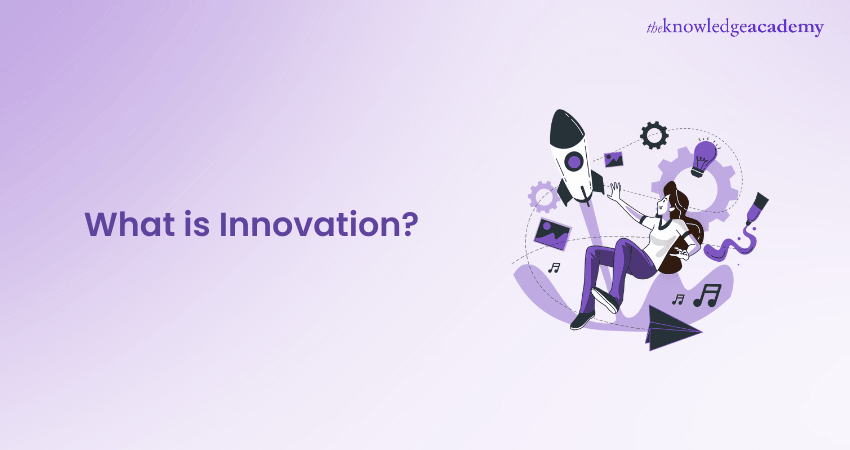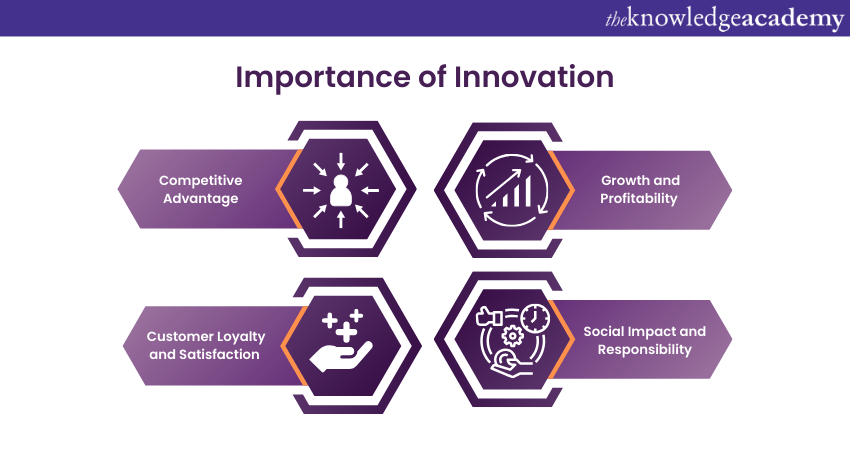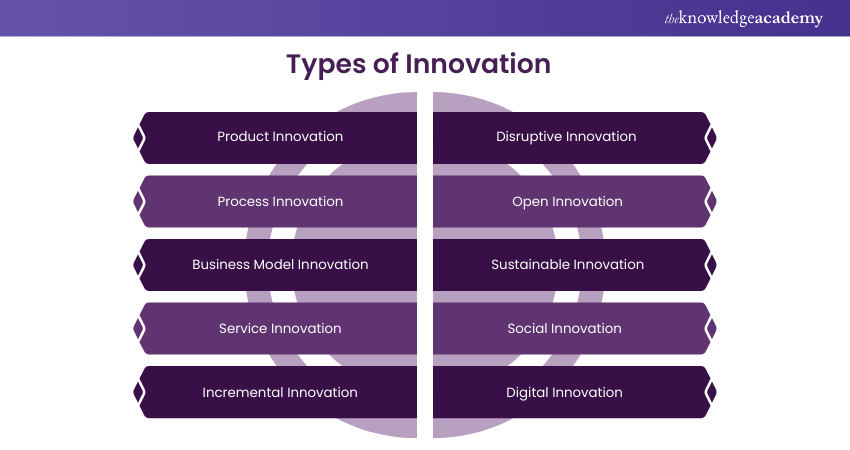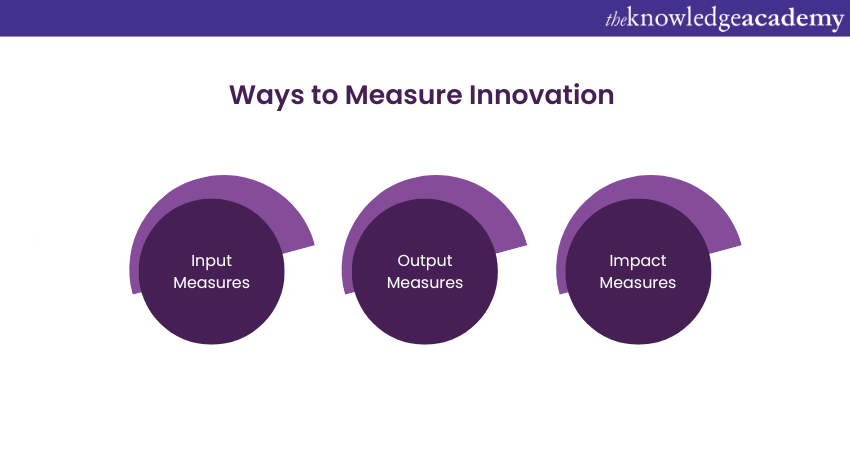We may not have the course you’re looking for. If you enquire or give us a call on +48 221041849 and speak to our training experts, we may still be able to help with your training requirements.
We ensure quality, budget-alignment, and timely delivery by our expert instructors.

Picture this: the wheel, the internet, self-driving cars. What do they all have in common? Innovation. It’s a word we hear everywhere—on billboards, in boardrooms, even in coffee shop debates. But What is Innovation? Is it about inventing something shiny and new, or is it more about rethinking the old in ways that blow our minds?
At its core, innovation is the spark that lights up possibilities, the bridge between "what is" and "what could be." It’s not just for tech giants or mad scientists—it’s something anyone, anywhere, can bring to life. In this blog, we’ll explain What is Innovation, why it’s so much more than just a fancy term, and how it shapes the world around us in ways we often don’t even notice.
Table of Contents
1) What is Innovation?
2) What is the Importance of Innovation?
3)The Three Stages of Innovation
4) Different Types of Innovation
5) Innovation Process: 7 Key Steps
6) What is an Innovation Portfolio?
7) Ways to Measure Innovation
8) Notable Pioneers in Innovation
9) How can Leaders Decide What Innovations to Prioritise?
10) How do Organisations Become Better Innovators?
11) How to Measure Innovation?
12) Conclusion
What is Innovation?
Innovation involves creating fresh ideas, techniques, items, services, or answers that result in meaningful and valuable outcomes. It translates Innovative ideas into tangible outcomes that improve productivity and performance or meet unrecognised requirements.
Although Innovation is typically linked to technological advancement, it also encompasses new methods of addressing problems, procedures, organisational strategies, and business structures. At its core, Innovation questions the current state, promotes creative thinking and accepts calculated risks to advance and achieve transformative results.
Innovation arises from curiosity, originality, and a thirst for progress. Innovative people welcome change, encourage brainstorming, and support trial and error. It can happen in different areas such as business, science, technology, social sectors, or public services and result in economic expansion, social progress, enhanced quality of life, and lasting development.
Key Components of Innovation
a) Culture of Creativity: Promotes trying new things and appreciates a variety of viewpoints.
b) Leadership Support: Offers resources and direction for new initiatives.
c) Collaborative Teams: Teams that collaborate with different functions promote diverse perspectives.
d) Resource Allocation: Allocates funds towards researching, developing, and utilising technology to promote Innovation.
e) Customer-centric Approach: Encourages Innovation through understanding the needs of customers.
f) Flexibility and Agility: Allows for rapid responses to evolving market needs.
g) Risk Management: Encouraging calculated risks and embracing failures promotes effective Risk Management.
h) Feedback Mechanisms: Feedback mechanisms involve employees and customers providing regular input to refine ideas.
i) Strategic Vision: Aligning Innovation initiatives with company objectives.
What is the Importance of Innovation?
Innovation is crucial for businesses and organisations, as it can provide them with various benefits, such as:

a) Competitive Advantage: Innovation allows companies to differentiate themselves by providing unique products or services. It assists businesses in remaining ahead by adjusting to changing customer demands, market trends, and industry disruptions.
b) Growth and Profitability: Innovation drives increased revenue and market growth by introducing new products, services in the markets. It additionally enhances productivity and reduces expenses by streamlining processes and managing resources effectively.
c) Customer Loyalty and Satisfaction: Innovation enables businesses to exceed customer expectations by providing improved solutions and experiences. Involving customers in the Innovation process helps establish trust and long-lasting loyalty.
d) Social Impact and Responsibility: Innovation enables businesses to address social and environmental issues, producing beneficial advancements. It also enhances alignment with stakeholder values, advocating for ethical and eco-friendly business practices.
The Three Stages of Innovation
Innovation is divided into three stages representing the different phases and aspects of the Innovation process. These are:

a) Ideation Stage: The Innovation process begins, and the ideas and concepts for Innovation are generated and explored. This stage involves brainstorming, research, observation, analysis, and synthesis to identify and understand customer needs, market opportunities, or technological advancements and generate and select potential solutions or alternatives.
b) Implementation Stage: This is where the Innovation process continues, and the ideas and concepts for Innovation are developed and tested. This stage involves prototyping, experimentation, validation, and evaluation to transform and refine the ideas and concepts into tangible and viable products, services, or processes and test and measure their feasibility, desirability, and viability.
c) Diffusion Stage: This is where the Innovation process ends, and the products, services, or processes for Innovation are launched and adopted. This stage involves marketing, promotion, distribution, and adoption that aim to introduce and communicate the products, services, or processes to the target customers, users, or markets and to facilitate and encourage their adoption and diffusion.
These three stages are not necessarily sequential or linear. Still, they can be iterative and cyclical, as the Innovation process can involve feedback loops, revisions, and improvements based on the results and outcomes of each stage.
Enhance your leadership skills to transform your organisation’s future with our Leadership Courses – Register now!
Different Types of Innovation
Here are some of the common types of Innovation:

1) Product Innovation
Product Innovation encompasses developing new products or enhancing current ones to satisfy evolving market requirements and customer anticipations. It involves improvements in features, aesthetics, speed, and user interaction.
2) Process Innovation
Process Innovation is centred on improving internal processes, systems, and technologies to make operations more efficient, reduce costs, and streamline workflows. Its objective is to enhance the organisation's agility and competitiveness.
3) Business Model Innovation
Business model Innovation changes how businesses generate, provide, and benefit from value. It examines fresh ways to generate income, manage costs, form partnerships, and enhance customer involvement to bring about market change and distinctiveness.
4) Service Innovation
It changes how customers interact with products by implementing new delivery methods, customisation features, and increased accessibility. The aim is to surpass customer expectations and enhance brand loyalty.
5) Incremental Innovation
Incremental Innovation refers to continuous enhancements and adjustments to current products, services, or processes. It promotes continuous improvements in effectiveness, excellence, and customer contentment, ensuring continued market significance.
6) Disruptive Innovation
Disruptive Innovation challenges current market standards and presents fresh solutions that offer new value propositions. It typically starts in specialised markets and gradually replaces incumbents by meeting the needs of customers that are not being fulfilled.
7) Open Innovation
Open Innovation involves working with third-party entities, including customers, suppliers, and research institutions, to create innovative solutions jointly. This strategy utilises outside knowledge and assets to speed up Innovation processes and enhance industry dominance.
8) Sustainable Innovation
Sustainable Innovation is centred on creating environmentally friendly products, services, and business models that reduce environmental harm and uphold social responsibility. It addresses worldwide issues such as climate change and resource preservation.
9) Social Innovation
Sustainable Innovation is centred on creating environmentally friendly products, services, and business models that minimise environmental harm and uphold social responsibility. It addresses worldwide issues such as climate change and resource preservation.
10) Digital Innovation
Digital Innovation uses the power of digital technologies—such as AI, IoT, and blockchain—to transform products, services, and operational processes. It optimises efficiency, enhances data-driven decision-making, and drives digital transformation.
Innovation Process: 7 Key Steps
Here are seven common steps in the Innovation process:
1) Spot Opportunities
Start by finding areas where Innovation is needed. This could be through market research, customer feedback, trend analysis, or looking at internal processes. The aim is to discover unmet needs, new trends, or problems that Innovation can solve.
2) Come Up with Ideas
Once opportunities are found, it’s time to brainstorm solutions. This can happen through team discussions, idea challenges, customer suggestions, or collaboration across departments. The goal is to gather as many creative ideas as possible.
3) Pick the Best Ideas
Next, review the ideas and choose the ones with the most potential. Consider factors like how practical the idea is, the resources needed, market demand, and how well it fits the organisation’s goals. Select the ideas that are likely to succeed.
4) Build and Test Prototypes
Turn the chosen ideas into basic models or samples, like mock-ups or simple versions of the product. This step allows you to test the idea, gather feedback, and make improvements.
5) Refine Through Testing
Try out the prototypes with real users or in real-world settings. Use their feedback to improve the idea. This back-and-forth process helps fix any problems and fine-tune the Innovation before it’s finalised.
6) Launch and Expand
When the Innovation is ready, put it into action. Create a detailed plan, assign resources, and roll it out step by step. Once it’s working well, scale it up to reach more people or areas.
7) Track and Improve
After the Innovation is launched, keep an eye on how it’s performing. Measure its success using key metrics and make improvements where needed. Learn from this experience to make your next Innovation even better.
What is an Innovation Portfolio?
An Innovation portfolio is a thoughtfully selected grouping of possible projects, each with specific objectives and necessary resources. Effectively managing this portfolio is important for discovering new opportunities and deciding on the best combination of initiatives, such as determining the right number and mix.
a) Confirming Total Value: Evaluating the complete value needed for the portfolio
b) Evaluating Existing Projects: Examining present Innovation endeavours considering their additional worth, risk factor, and conformity with strategic goals
c) Saying “No”: Easily discontinuing projects that waste resources and avoiding small initiatives that may not bring enough benefits
d) Reallocating Resources: Shifting abilities and expertise towards new or current projects that could use extra assistance
e) Identifying Gaps: Recognising deficiencies in the portfolio and developing new strategies to fill those gaps
Ways to Measure Innovation
There are various ways to measure Innovation, depending on the measurement's purpose, context, and perspective. Some of the common ways to measure Innovation are:

a) Input Measures: It monitors the resources committed to Innovation endeavours, including expenditures on R&D, time allocated to brainstorming, and the volume of newly launched projects. These measures assist in assessing a company's dedication and endorsement of Innovation.
b) Output Measures: It assesses the tangible outcomes of Innovation, such as the quantity of new products introduced, patents submitted, or process enhancements. These indicators show how productive and efficient Innovation activities are.
c) Impact Measures: It evaluates the effects and consequences of Innovation on business performance and market success. Key metrics include increased profits from newly launched products, customer happiness level, a portion of the market captured, and total impact on the sustained competitive edge.
Notable Pioneers in Innovation
Many individuals, organisations, and movements have accomplished remarkable Innovation in various fields. Here are some of the most notable examples:
a) Steve Jobs and Apple: Steve Jobs was the co-founder and CEO of Apple, one of the world's most innovative and influential companies. He was responsible for creating and launching some of the most iconic and revolutionary products in the history of technology, such as the Macintosh, the iPod, the iPhone, and the iPad. He was also known for his visionary and charismatic leadership, obsession with design and user experience, and relentless pursuit of excellence and Innovation.
b) Elon Musk and Tesla: Elon Musk is the founder and CEO of Tesla, one of the most Innovative and disruptive companies in the automotive industry. He is also the founder and CEO of SpaceX, one of the most Innovative and ambitious companies in the aerospace industry. His passion and vision drive him to transform the world and humanity by creating and advancing sustainable energy, electric vehicles, and space exploration.
c) Muhammad Yunus and Grameen Bank: Muhammad Yunus is the founder and chairman of Grameen Bank, one of the most innovative and impactful organisations in the social sector. He is also the pioneer and leader of the microfinance movement, which provides small loans to poor and marginalised people, especially women, to help them start or expand their businesses and improve their lives and livelihoods. He also received the Nobel Peace Prize for his efforts to create economic and social development through Innovation.
d) Martin Luther King Jr. and the Civil Rights Movement: Martin Luther King Jr. was the leader and spokesperson of the Civil Rights Movement, one of the most Innovative and influential social movements in the history of the United States. He was also a preacher, activist, and Nobel Peace Prize laureate who advocated for nonviolent resistance and civil disobedience to fight against racial discrimination and injustice. He was also the inspiration and catalyst for many other social movements and causes, such as human rights, peace, and democracy.
Learn essential strategies to empower your team with our Leadership Skills Training – Sign up now!
How can Leaders Decide What Innovations to Prioritise?
Successful Innovation commonly arises when multiple important factors come together to help determine what should be given priority. The most vital components are the individuals involved, the actions taken, and the methods used.
a) An Unmet Customer Need (the ‘who’): Who is the customer, and what issue do they need to be addressed? Do macro trends such as automation impact shifts in customer demands?
b) A Compelling Solution (the ‘what’): Is the proposed solution attractive and feasible for execution?
c) A Profitable Business Model (the 'how'): In what way will the solution generate value? What type of business model will sustain it?
To succeed in Innovation, it is crucial to have definitive responses to all of these inquiries.
An example from inventor Thomas Edison effectively demonstrates this concept. In a conversation about Innovation, Furstenthal emphasises the fact that in all instances, he created not only the what but also the how. For example, Edison not only invented the filament and vacuum tube that made the light bulb work but also designed the manufacturing process for mass production.
Manage your team effectively to foster Innovation with our Managing Innovation Training – Join today!
How do Organisations Become Better Innovators?
To become better innovators, organisations should prioritise Innovation and set clear growth targets. They need to invest in a mix of projects and provide the right resources. R&D efforts should focus on turning ideas into valuable solutions, while creating strong and scalable business models.
How to Measure Innovation?
To measure Innovation, organizations can track the number of new ideas or products developed over time. They should also monitor the impact of these Innovations on sales, customer satisfaction, and market share. Another key measure is the speed at which Innovations are created and launched. Lastly, measuring the Return on Investment (ROI) from Innovations helps assess their overall success. It's important to note that while tracking new products can reflect Invention, measuring the impact on sales and market share focuses more on the success of Innovation (the implementation and commercialization of new ideas), highlighting the distinction between Innovation vs Invention.
Conclusion
And there you have it—What is Innovation? It’s not just for the tech-savvy or the big players. It’s a mindset, a way of looking at the world and daring to ask, “What if?” It’s about challenging the status quo, finding new ways to solve old problems, and transforming ideas into something real that makes an impact. Whether you’re creating a new app, streamlining a process at work, or coming up with a fresh take on something familiar, you’re an innovator in your own right. So, don’t be afraid to think outside the box, break the mold, and see where your curiosity and creativity take you.
Learn best practices of social innovation with our Social Innovation Course – Join today!
Frequently Asked Questions
What is Innovation for a Business?

Innovation in a business involves creating new products, processes, or models that increase value, stimulate growth, and meet changing market needs efficiently.
What is the Importance of Innovation?

Innovation is important for organisations to remain competitive, enhance efficiency, and meet customer needs in the changing market conditions.
What are the Other Resources and Offers Provided by The Knowledge Academy?

The Knowledge Academy takes global learning to new heights, offering over 3,000 online courses across 490+ locations in 190+ countries. This expansive reach ensures accessibility and convenience for learners worldwide.
Alongside our diverse Online Course Catalogue, encompassing 19 major categories, we go the extra mile by providing a plethora of free educational Online Resources like News updates, Blogs, videos, webinars, and interview questions. Tailoring learning experiences further, professionals can maximise value with customisable Course Bundles of TKA.
What is The Knowledge Pass, and How Does it Work?

The Knowledge Academy’s Knowledge Pass, a prepaid voucher, adds another layer of flexibility, allowing course bookings over a 12-month period. Join us on a journey where education knows no bounds.
What are the Related Courses and Blogs Provided by The Knowledge Academy?

The Knowledge Academy offers various Leadership Courses, including Leadership Skills Training, Agile Leadership Training, and Managing Innovation. These courses cater to different skill levels, providing comprehensive insights into Innovative Thinking.
Our Business Skills Blogs cover a range of topics related to Innovation, offering valuable resources, best practices, and industry insights. Whether you are a beginner or looking to advance your Innovation skills, The Knowledge Academy's diverse courses and informative blogs have got you covered.
Upcoming Business Skills Resources Batches & Dates
Date
 Managing Innovation
Managing Innovation
Fri 4th Apr 2025
Fri 27th Jun 2025
Fri 29th Aug 2025
Fri 24th Oct 2025
Fri 5th Dec 2025






 Top Rated Course
Top Rated Course



 If you wish to make any changes to your course, please
If you wish to make any changes to your course, please


